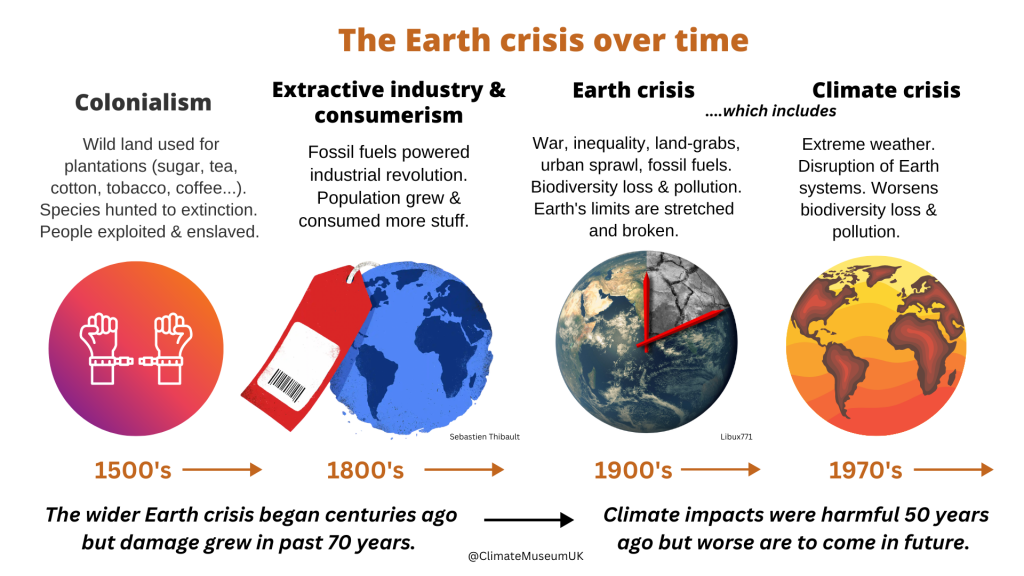Root causes: historic injustice and degenerative culture
This diagram puts the crisis in a context of time, with colonialism continuing from past centuries.

Multiple links have been categorically proven between extractive activities accelerating over recent centuries and the global impacts of a heating planet. These activities have their origins in colonialism and their impacts fall disproportionately on the Global South, but also on disadvantaged communities in countries like the UK. Many aspects of contemporary crises have arisen out of long histories and recent accelerations of the extraction of natural resources and human bodies for individual, corporate and national profit.
Politicians have formed alliances with business leaders and investors that accumulate the profits, and who are paying to manipulate the media, education and the cultural sector. This is enabling them to take over national democracies in their favour, including the UK Government. Their goals include changing the balance of laws and regulations to favour freedom to extract and exploit over the freedoms of citizens and more-than-human life.
“One of the most significant changes affecting Western societies over the past fifty years at least has been the quick chain of energy transitions, first from animal power to fossil fuels…People in high-income countries now consume 50 times the amount of energy of ancestral communities of hunters-gatherers…; they travel 100 times faster and eat 2 to 3 times the amount of meat-based products…, a diet fuelled – literally – by a fossil-fuel-dependent agriculture.”
British Educational Research Association, 2023
Impacts of this
Degraded environments and pollution
There is widespread devastation of forests, oceans, rivers, mountains, wetlands and grasslands, whether due to direct use for agribusiness, mining and urban development, or from the indirect impacts of pollution and climate breakdown. This is leading to mass extinctions of a diverse array of species and depletion of productive land, causing disease, hunger and displacement. Human activities have wiped out 70% of animal populations since 1970.
Global health crises
Covid-19 is still prevalent, and other zoonotic pandemics will emerge from climate breakdown (for example from melting permafrost) and from continued destruction of wildlife habitats.
Meanwhile air pollution causes 7 million deaths annually, resulting from vehicle emissions, animal agriculture, burning of coal and wood, and industrial waste.
The food system is the biggest environmental problem globally, as a major contributor to climate change, biodiversity loss, pollution, animal harm and human ill health. Health impacts include malnutrition (due to unequal distribution and highly processed food), obesity and diabetes.
Global conflict and displacement
War and conflict are ramping up as one of several intersecting crises that come from the degenerative system, worsened by the impacts of the Earth crisis. There are currently major conflicts in Ukraine, Yemen, Syria and further civil wars in Africa and South America. These result from conflict over resources, often fossil fuels and land for agriculture, stirred by extractive capitalism, nationalism, religious ideologies and authoritarian leadership. The most dangerous agents of war are those nations extracting the most resources, harbouring the most corruptly sourced wealth, and building arsenals of environmentally-destructive weapons.
Fossil fuel corruption and energy prices
The fossil fuel industry has been profiting $3 billion a day for the past 50 years. Record excess profits are projected for 2023 due to rising prices that fall on customers, with the poorest facing unaffordable bills this winter. Yet, the industry continues to lobby governments and influence the media, for example, through Net Zero Watch. Russia’s invasion of Ukraine has thrown light on our dependence on fossil fuels and their supply from totalitarian regimes, resulting in calls both to increase local supplies of fossil fuels and to increase investment in renewable energy, as well as nuclear power.
Extreme weather and other impacts of Global Heating
Signs of climate breakdown from Global Heating are appearing up to three decades sooner than projected. For example, the Antarctic is losing ice at twice the rate previously thought. Extreme weather events arising from climate breakdown are strongly affecting the privileged North, while the Global South is experiencing unbearable temperatures, and there is increased displacement from areas such as Sub Saharan Africa. Famine has increased 6 fold over the past two years, there was a 20% rise in global food prices in 2021, and the current drought has reduced the harvest by c.30% in 2022. Global Heating is also causing species collapses and extinctions by damaging habitats, changing migratory patterns and growth seasons, and increasing diseases.
In October 2022, the UN has reported that there is no credible path to limit the increase in warming to 1.5C. In response, activists in the UK are calling for a Climate & Ecological Emergency Bill, are asking for a stop to the extraction of fossil fuels, and for climate finance reparations to the most affected peoples and places.
More links on the Earth crisis
The wider Earth crisis: climate, biodiversity and pollution
- Why we use the term ‘Earth crisis’, and about the blinkers or tunnel vision that prevents us from seeing more widely beyond climate change
- Planetary Boundaries: Stockholm Resilience Centre. Breaking Boundaries is an Attenborough-narrated film about them.
- Large selection of environmental Infographics for graphic ways in to research (a Climate Museum UK collection)
Climate Science and Global Heating
- For authoritative evidence, go to Climate NASA / Evidence
- A large selection of explainers on: ‘Climate Basics’ (a Climate Museum UK collection
- Greta Thunberg ‘The Climate Book’
- The Tyndall Centre for Climate Change Research
- This animated film is one of the best for summing up the Great Acceleration of human consumption, how we became Energy Blind, and the need for a Great Simplification.
- Climate Outreach has lots of climate visuals and research on how to engage people